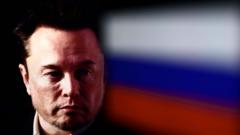In a turbulent political landscape, Senators Jack Reed and Jeanne Shaheen raise alarms over Elon Musk's communications with Kremlin leaders, questioning his credibility as a defense contractor.
Senators Demand Inquiry into Musk's Russian Interactions

Senators Demand Inquiry into Musk's Russian Interactions
Two prominent Senate Democrats have initiated a push for a federal investigation into Elon Musk’s dealings with Russian officials.
Two influential Senate Democrats, Jack Reed and Jeanne Shaheen, are calling for a federal investigation into the reported contacts between Elon Musk and senior Russian officials, including President Vladimir Putin. In light of recent revelations that Musk has engaged in "multiple high-level conversations" with Kremlin officials since 2022, the senators have requested that the Pentagon and Justice Department evaluate the implications of these interactions on Musk’s company, SpaceX, which holds lucrative defense contracts with the U.S. government.
In a post on his social media platform, Musk reacted strongly, vowing to identify and “nuke” those making allegations against him, while labeling the senators as "puppets" and "knuckleheads." This verbal confrontation highlights the tense relationship between Musk and the lawmakers who penned a letter to Attorney General Merrick Garland and the Defense Department’s Inspector General Robert Storch. Their letter expresses "serious questions" regarding Musk's reliability as a government contractor, particularly given Russia's positioning as a potential threat to U.S. national security.
The senators pointed out earlier this year, intelligence reports indicated that Russia has developed a counter-space capability, which could jeopardize U.S. satellites in low-Earth orbit. They also noted Musk's lack of disclosure regarding his interactions with foreign officials, a requirement for individuals holding high-level security clearance. Reed and Shaheen specifically mentioned Musk's discussions with Sergei Kiriyenko, a key Kremlin aide implicated in efforts to disseminate Russian propaganda on social media platforms, including Musk's own X (formerly Twitter).
The letter concluded with a call for an immediate review to determine whether Musk’s ties with Russian leaders warrant scrutiny to assess his eligibility to participate in current and future U.S. government contracts. Adding complexity to the situation, Musk has recently become involved in international diplomatic efforts, including communications with Ukrainian and Turkish leaders, amid claims he is set to lead a newly established "Department of Government Efficiency" under Donald Trump’s incoming administration.
As this unfolding situation continues to develop, it raises critical questions about the intersection of private enterprise, national security, and the implications of high-profile individuals navigating global political dynamics.




















